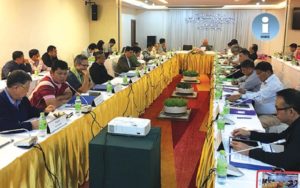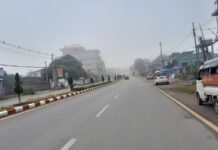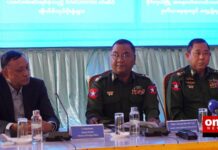(11-12 January 2018)
Every man is my superior in some way
In that I learn from him.
Ralph Waldo Emerson (1803-1882)
In December, I was planning to travel to Taunggyi in order to observe the planned public consultations, regarded as the first and indispensable step for what is known as the national dialogue (ND), that will finalize the proposals to the Union Peace Conference (UPC), popularized now by the NLD government as the 21st Century Panglong (21CP). Reports then came that the government, particularly the military, had blocked the public consultations, thereby putting the convening of the next UPC, scheduled for the last week of January, limbo.
An emergency meeting of the Peace Process Steering Team (PPST), the leading organ of the 8 signatory EAOs, was therefore held to assess and decide how to handle the situation.
The following journal tries to present what took place during those two days.

Day One. Thursday, 11 January 2018
Anger doesn’t solve anything.
It builds nothing, but it can destroy everything.
“A peace process cannot operate under a command system,” Gen Mutu Saypoe, who chairs the meeting stresses in his opening speech. “It is based on the principles of mutual recognition and trust building.
“It can be concluded from the ongoing frictions that each side’s interpretation of the NCA (Nationwide Ceasefire Agreement) is still different from the other,” he adds. “The answer to them can be sought only by embracing the new culture of political dialogue instead of force of arms, as agreed in the NCA.”
Padoh Ta Do Moo, leader of the EAO UPDJC, then reports why the meeting has been called:
On 30 December, the 19th UPDJC meeting was held. Our findings were, although the JICM had resolved to convene the 21CP#3 (UPC#4) during the last week of January, we were not given sufficient time:
- To hold public consultations
- To hold joint UPDJC meetings (which also include secretariat meetings and the meetings of working committees on 5 dialogue topics)
The RCSS and ALP are also facing problems in holding public consultations. All the while CSO forums are being allowed to hold all over the country.
Our recommendations therefore are:
- To postpone the 21CP#3
- To negotiate on the inclusion of public consultations in the ToR (Terms of Reference)
Progress reports are then presented by each representative, which I will try to summarize. (Of the 8 EAOs, only PNLO, which is holding a congress, held every 3 years to elect a new leadership, is absent.)
RCSS
- The RCSS, annual chair for the CSSU, had planned to hold public consultations, 17-25 December, in 14 towns/cities
- 17 December, while the PPST Preparatory Meeting for the UPC#4 (21CP#3) was ongoing, reports came that public consultations in Panglong had been stopped by the military
- 18 December, the PPST wrote to the UPDJC, which is chaired by Daw Aung San Suu Kyi, to notify authorities concerned to render full cooperation with the holding of public consultations
- 19 December, Shan State government issued directives to local authorities to cooperate with groups holding public consultations
On the same day, the Eastern Region Command, based in Taunggyi, wrote to RCSS chief liaison officer to suspend the public consultations
- 22 December, Shan State Government repealed its 19 December directive
- Gen Yawd Serk then wrote to the State Counselor and the Commander in Chief protesting the government-cum-Tatmadaw’s obstruction of the public consultations. No response.
- 30 December, at the UPDJC meeting, government representative said there would be no negotiations on public consultations, as they were not on the JICM approved Framework for Political Dialogue (FPD). “When we were drafting the SOP (Standard Operational Procedures), we had proposed to include a clause on Public Consultations. Government representatives replied at that time it was already an mutually accepted procedure and therefore no need to insert it.”
- 5 January, Dr Tin Myo Win, Chairman of the Peace Commission, met the Commander in Chief, to seek approval for ND Preparatory Meeting in Taunggyi, 7-9 January. No success. According to one representative, he had named two towns for the RCSS to choose from: Kholam or Mongnai as alternatives. “But it was already too late to organize the pre meeting, even if he had agreed to Taunggyi,” he told me.
- 8 January, RCSS sends open letter to the State Counselor that the planned ND in Langkher has been temporarily postponed
- 9 January, Planned UPDJC meeting cancelled.
Note
According to a UNFC member, who had recently met Dr Tin Myo Win, the government has already decided now that the plan to hold the UPC in the last week of January is out of question, it is retargeting the date to one week after the Union Day.
CNF
We had planned to hold public consultations in 12 locations. We faced some difficulties in 8 of them which we were able to overcome. Now they are preventing us from holding the remaining 4. Why are they doing this? Public consultations are an agreed point in the bilateral agreement.
ALP
It has planned 5 locations including Yangon to hold public consultations. However the government/Tatmadaw is giving “delicate situation” in the Rakhine State as an excuse to discourage us from holding them. But we know and they know Rakhine State has 17 townships and the majority of them are not under a “delicate situation.”
ABSDF
Our plan was to hold public consultations in Yangon, Mandalay, Magwe, Monywa, Bassein/Pathein, Pegu and Tavoy/Dawei. So far not much trouble. We have also found out that the Bamar/Myanmar/Burmans who are the majority in the lowlands also want a federal system.
KNDCC (Karen National Dialogue Convening Committee)
It is made of KNU, DKBA and KNU-KNLA PC. It plans to hold public consultations in at least 5 regions/states: Karen, Irrawaddy, Pegu/Bago, Yangon and Taninthayi/Tenasserim, 12-20 January.
JMC
There is need to review the NCA Chapter 3 (Ceasefire Related Matters). Words like “ceasefire areas” and “controlled areas” need mutually agreed definitions. For example, at JMC#3, the Tatmadaw accused the RCSS of area transgression. The RCSS countered by saying thus far there had been no demarcation.
Speaking of demarcation, it cannot be done by JMC. It can be done only through military to military negotiations. The JMC’s job starts only after demarcation is completed. However, the Tatmadaw appears to be more interested in “disengagement”—how to avoid confrontations—than demarcation.
Civilian protection is also an important subject that is yet to be discussed thoroughly.
The problem
- Different concepts of the peace process and different interpretations of the NCA. The inability to reach agreement on them during the NCA and FPD implementation reviews. Let alone the public consultations, NDs for those EAOs that had held them last year remain in question.
- One disagrees to the above assessment: The Tatmadaw has better understanding of the peace process as well as the NCA. It knows how dangerously close the people and the EAOs will become through public consultations. That is why it is doing its utmost to prevent them. For all the generals care, they will not be the losers if the UPC does not take place. Instead, the big losers will be the Aung San Suu Kyi government.
- The government in reality is under the mercy of the Tatmadaw. The people may have conferred the power to Daw Aung San Suu Kyi. However this power has not reached her hands, but to only the hands of the Tatmadaw instead.
- Under the Tatmadaw, it is no longer a joint process anymore. It has become one that is being dictated by the Tatmadaw.
The way out
- The problem cannot be solved either at the UPDJC, JICM or UPC level.
- It also cannot be solved by a certain foreign country that is pursuing a parallel process
- The Tatmadaw seems to be holding most of the high cards. But it has, like us, its own fears and anxieties. So it’s time for each side to lay them on the table.
- Back-channeling—informal meetings of a handful of people trusted by both sides—a mechanism employed during the South African peace process, should be one to consider
- All in all, we need to review our peace strategy. “The NCA, signed by the Commander in Chief himself and made into law by the Parliament,” says one leader, “is our strategy as well as our defensive weapon.”
“It’s okay to work (for peace),” quipped one, “But don’t forget to pack your bags and ready to go too.”
No final decision today at 16:40, when the meeting adjourns. But the postponement of the UPC is already a foregone conclusion by then.

Day Two. Friday, 12 January 2018
The military is betraying its own Three National Causes.
An EAO representative, upon hearing the military’s disruption of public consultations in Shan State, 18 December 2017
Today the meeting discusses the relationship between the NLD government and the Tatmadaw:
- The Tatmadaw is not only afraid of public consultations organized by the EAOs but also rallies organized by the NLD. Only forums held by CSOs are allowed to take place without disturbance from its units
- The military doesn’t look like wanting Daw Suu to succeed either in the peace process or economy
- Daw Suu has tried to change the constitution three times already, all without success
- The first time in 2014, when she gathered more than 5 million signatures supporting her call to amend the charter
- The second time, when she tried it again with her party’s majority seats in the parliament
- And the third time, by going through the peace process’s 7 step roadmap
- There are reports that the Commander-in-Chief’s office doesn’t take notice of letters coming from the State Counselor’s Office as the office is not named in the 2008 constitution
- Not that the military has not tried to negotiate with her. For example, since she has taken office, the military has reportedly urged her to hold the 11-person National Defense and Security Council (NDSC), regarded as the most powerful organ in the country, in which she, being a foreign minister, holds the right to participate. The military was even said to have assured her that there would be no decision by vote (the military has 6 votes, the non-military 5). No one really knows why she keeps refusing to call it.
- Also, when it comes to the peace process, we all know the U Thein Sein government had formed the Union Peacemaking Central Committee (UPCC), the highest decision making body, headed by the President himself and the Commander in Chief. By contrast, her National Reconciliation and Peace Committee (NRPC) has only herself and a few high ranking generals, but not the President and the Commander-in-Chief. In the end, the NRPC only turns out to be a Thingyan cannon (that only fires a blank round).
- Still she is extremely useful to the military as a “Two Gs”: Internally, she is the “Guard” protecting the military from public censure, while externally she is the “Goat” for all the excesses the military has been accused as committing
The meeting, based on the above information, then discusses how to overcome the impasse:
- Nobody wants to return to the pre-2011 situation
- The military says it also wants to establish a “Union based on democracy and a federal system.” But how can it be achieved without the active participation of the people?
- Before 2011, war was our only resort, because each successive government was stubbornly sticking to its own credo (“like a rabbit standing on a single leg,” as the Shans say). We hope this old culture will not be reestablished
- Though we must be firm when it comes to our principles, we must also be flexible in our negotiations
- Informal meetings, in our experience, have been invaluable. We still remember it took 6 informal meetings for the military to agree to do a military Code of Conduct (CoC) with the EAOs.
The result is the resolution for the KNU chairman to make an “icebreaking” trip to meet both the State Counselor and the Commander in Chief. If the trip goes well as expected, the stalled peace process can hopefully restart.
The next item is on the meeting between the PPST and the UNFC, scheduled for tomorrow. So far the two sides have met 8 times at the PPWT-DPN level. This will be the first time they will be meeting at the top level:
- The planned meeting is approved
- The PPST delegation will urge the UNFC to sign the NCA, in accordance with Resolution #10 of the PPST Meeting #16, 14-15 November 2017.
“The change that we want will come only when all of us are on board,” says a leader.
It is already 17:30 when I leave the hotel.

Day Three. Saturday, 13 January 2018
He who angers you conquers you.
The PPTT Emergency was over yesterday. But today we are meeting the UNFC, of which only the essentials will be reported here.
UNFC – The three groupings: PPST, UNFC and FPNCC must have cooperation, because we are all working for the same cause
PPST – An agreed mechanism must be established to do that, for example, an agreement to hold regular meetings
UNFC – We have held 8 formal meetings with the Peace Commission (PC). At the 7th meeting, every point was as good as agreed. But then at the 8th meeting, the Tatmadaw went back to the second point that had previously been agreed, and said the word “Federal Democracy” was unacceptable. (The military is for “a union based on democracy and federal system” in accordance with the NCA text). As a result the 9th meeting scheduled in December was cancelled.
(There are also other matters still undecided between the two sides, which are better left unsaid for the time being)
As a result, we are trying to resolve it through a parallel process.
PPST – The PPST would like you to sign the NCA. More of you means more leverage for all of us.
UNFC – Due to the current deadlock between you and the government, we don’t know it will make any difference even if we sign the NCA.
The two sides also discusses the possibility of holding an EAO summit before the next UPC, and the matter of the DDR which the military is insisting should be negotiated.
UNFC – We heard that the DDR topic was touched upon by Senior Gen Min Aung Hlaing during his meeting with Gen Mutu Saypoe (following the ceremony marking the 2nd anniversary of the NCA signing).
PPST – He didn’t put it quite that way. What he actually said was:
- There should be only one national armed forces. Those who wish to continue to be soldiers should enlist in it
- On the other hand, those who are keen on politics, should join or set up a party
- As for those who want to do business, they should either join or set up a business firm
- As for the rest, they can return to civilian life
However, at the JMC-U meeting, the Tatmadaw generals had interpreted what he said as DDR.
Note:
Here I remember that the first time the military broached the DDR subject was not just recently. In 2016 when the UPC#2 (aka 21 CP#1) was held, it was already spelled out in the paper read out by military representatives.
The two sides are expected to meet again next month, though no definite decision is taken.
We wind up the meeting with lunch served at the hotel.
Nai Hong Sa asks me who’s older, him or me. We both were born in 1948. I inform him he is, since he’s born in January and I in May












Leave a Comments